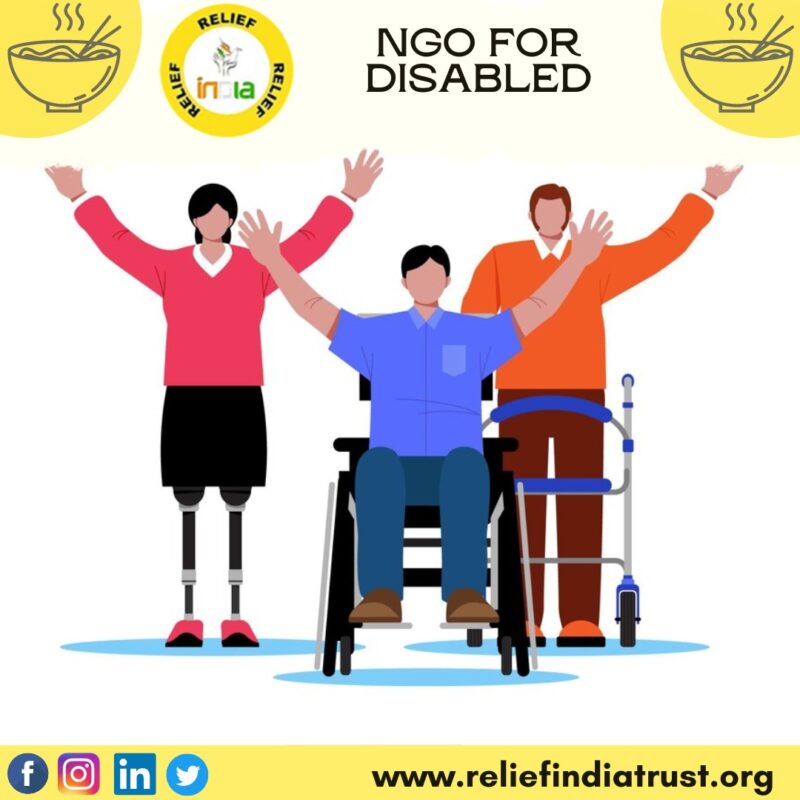People with disabilities are often viewed with sympathy and pity, but this is not helpful. Many people do not know how to properly interact with individuals with disabilities. As human beings, it is our duty to support and encourage one another. We should view a person’s flaws or limitations as opportunities for growth and the development of new skills. Unfortunately, India is lacking in this area. People and children with physical disabilities deserve to be treated with respect and should have access to the same opportunities as others. This is the belief of Relief India Trust NGO for Disabled and helps them overcome their challenges and improve their lives.
How can equal, encouraging treatment help physically challenged people? Relief India Trust NGO for Disabled Motives
Our NGO for Disabled motive is to create a society where everyone gets equal treatment. We strongly believe that encouragement and equal treatment can remove the obstacles in people’s minds regarding disability. We want them to feel hopeful and believe that their disability is not something they should worry about but rather a chance to be more skilled in every aspect of their lives.
We aim to encourage a new sense of individuality and strong, confident self-encouragement that can boost their self-esteem. With this, they will no longer feel pity or low about themselves. This is what we aim to do at Relief India Trust.
Why is disability in India increasing rapidly?
There are several reasons why disability is increasing rapidly in India. Among younger age groups, polio (62%), other illnesses (10%), injuries other than burns (11%), and burns (3%) are the major causes of disability. While some cases of disability are genetic and occur at birth or due to certain complications during pregnancy, taking care of oneself is crucial in order to avoid disability.
Disability statistics in India
Between 1881 and 1931, the rate of infirmity per 1 lakh population ranged from 228 to 369. The Census Commissioner of India included a disability status question in both the 2001 and 2011 censuses. According to the 2011 census, 2.21% of India’s population, or 2.68 crore people, are disabled. Of this number, 56% are male, while 44% are female. Most of the disabled population (69%) lives in rural areas.
The percentage of disabled males is 2.41%, while for females, it is 2.01%. Between 2001 and 2011, the number of disabled people increased for both rural and urban areas and for males and females. During this period, the percentage of disabled persons in the total population, as well as in the male and female population, also increased.
Why are people with disabilities who live in slums experiencing the most suffering?
Individuals with disabilities who live in slums face a great deal of hardship due to a variety of factors. This includes limited access to essential resources such as healthcare, education, and employment opportunities, as well as social stigma and exclusion.
The harsh living conditions in slums make these challenges even more difficult to overcome, making it harder for people with disabilities to lead fulfilling lives. It is crucial to address these issues through inclusive policies and community efforts.
How can providing equal opportunities for individuals with physical challenges be a life-altering turning point for them?
Providing equal opportunities for individuals with physical challenges can be a life-altering turning point for them. It opens doors to personal growth, self-confidence, education, employment, and social activities. This empowerment enables them to overcome barriers and showcase their abilities, fostering a sense of belonging and self-worth.
By embracing their talents and potential, these individuals can lead more fulfilling lives and inspire others to do the same. Ultimately, this contributes to a more inclusive and compassionate society.
Relief India Trust NGO for Disabled Uplifting Special Individuals
Relief India Trust NGO for Disabled supports individuals with disabilities. We believe that helping these people can create a more equal society where everyone has the opportunity to live with dignity and stand tall.
We want to eliminate the stigma that individuals with disabilities face and believe that they have the ability to achieve their dreams just like anyone else.
Our initiatives
- We are an organization that provides quality education to people with disabilities. We organize education camps where we provide literacy along with study materials at their doorstep, spreading happiness to those who thought they would never get an education.
- In addition to education, we also distribute healthy meals three times a day to individuals and children, which helps nourish their bodies and contribute to their overall health. We are dedicated to uplifting their health, and for this. We offer healthcare facilities such as regular check-ups for common illnesses, free medicines, and disease awareness programs that enable people with disabilities to live healthier and more prosperous lives.
- We also conduct fitness-related activities in our rehab center, which help individuals with disabilities stay active and fit. We believe that physical fitness contributes to overall well-being and helps people with disabilities lead a better life.
- Along with providing education and healthcare, we also take good care of their personalities. We provide free clothes to children, men, and women, enabling them to cover their bodies and giving them a sense of respect and dignity.
Conclusion
Disability is not a curse. Until we stop seeing it as a curse, it can never hinder the willpower of any individual. We want to spread this mentality in society. This positive mindset can improve the lives of people with disabilities. Along with our various initiatives. We are dedicated to helping this community grow, achieve their life dreams, and contribute to their families and country.
Click on https://www.reliefindiatrust.org/ to read and know more about NGOs Relief India Trust NGO. Follow us on Facebook, Instagram, Twitter, and LinkedIn for daily updates. We update our various activities that help the poor better survive.

